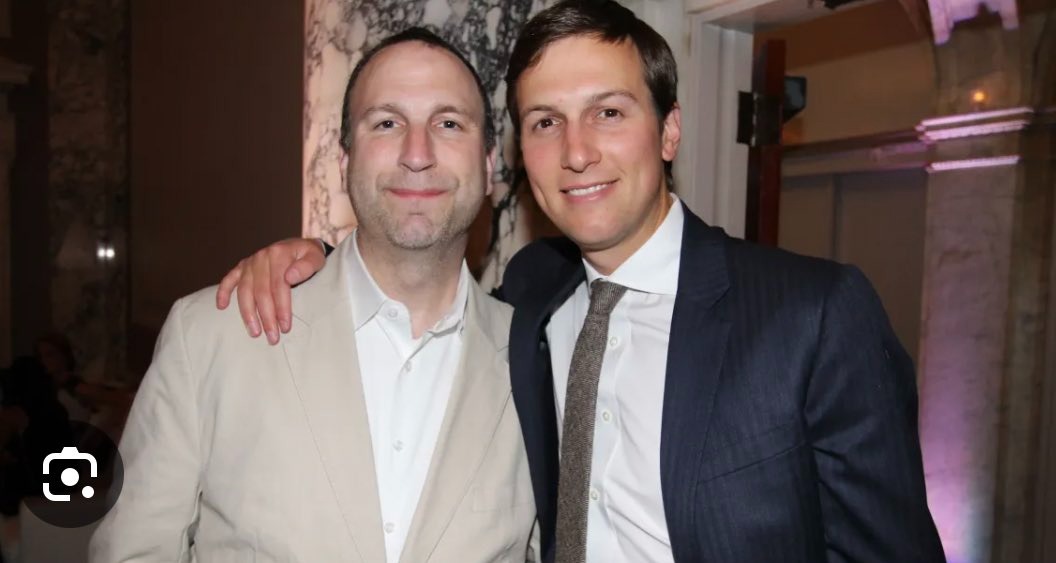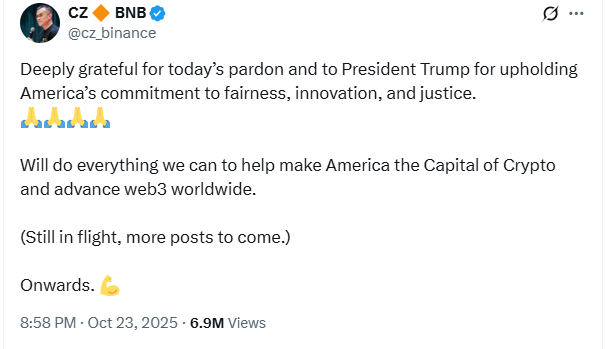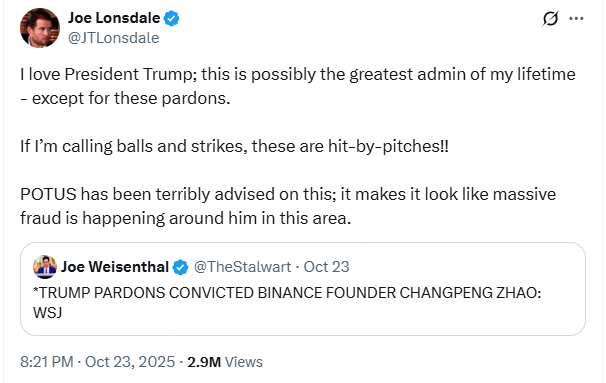CZ Latest in Trump Crypto Pardons
US President Donald Trump pardoned Changpeng Zhao, also known as CZ, on Oct. 21. The former Binance executive is just the latest on a growing list of convicted crypto executives to receive clemency from the White House.
Even on the campaign trail, Trump promised to make an about-face on crypto policy and grant clemency to individuals such as Silk Road founder Ross Ulbricht. The president cited instances of lawfare from the Biden administration as a significant motivator.
While starting with Ulbricht in January, the list has grown to include four executives from the exchange BitMEX as well. This has encouraged some high-profile crypto figures behind bars, such as former FTX CEO Sam Bankman-Fried, to make overtures to the Trump administration.
As the number of pardons, particularly those for high-level crimes, increases under Trump, observers and ethics watchdogs are concerned about corruption.
Ken Kurson, Ripple board member, Modern Consensus co-founder
Pardoned Jan. 20, 2021

On the morning of the last day of Trump’s first term in office, he pardoned a Ripple board member and co-founder of crypto media outlet Modern Consensus. Ken Kurson, a friend of Trump’s son-in-law Jared Kushner, was convicted of cyberstalking his ex-wife.
In 2016, Kurson joined the board of directors of Ripple, the fintech company associated with the XRP (XRP) token. He served on the board until 2020, when the harassment charges were brought against him.
According to a pardon message from the White House, “Mr. Kurson’s ex-wife wrote on his behalf that she never wanted this investigation or arrest and, ‘repeatedly asked for the FBI to drop it.’” Trump said that the only reason he was prosecuted was “because Mr. Kurson was nominated to a role within the Trump Administration.”
Kurson was being considered for a position on the board of the National Endowment for the Humanities. In 2018, he was removed from consideration after the Federal Bureau of Investigation found allegations of stalking and harassment.
Journalist Deobrah Copaken claimed that Kurson passed her over for a job after she rebuked his sexual advances. Following the pardon, she said, “I’m terrified I’m going to be looking over my shoulder every day.”
Ross Ulbricht, founder of narcotics market Silk Road
Pardoned Jan. 21, 2025

On the second day of his term, Trump pardoned Ross Ulbricht, the founder of the online narcotics marketplace Silk Road.
Ulbricht had already served 11 years of a life sentence without parole for running the site, which accepted cryptocurrencies like Bitcoin (BTC) as a payment method. He was convicted under the “kingpin clause” for high-level narcotics offenders.
Activists from varying backgrounds lobbied for his pardon. Criminal reform groups believed that the kingpin clause was harsher than necessary. Libertarian groups believed that selling drugs, while illegal, isn’t a moral failing, so long as adults buy and sell them willingly. Some in the crypto space saw him as a pioneer of crypto payments despite the fact that they were used to buy illicit drugs online.
Trump wrote on Truth Social, “The scum that worked to convict him were some of the same lunatics who were involved in the modern day weaponisation of government against me.”
Since leaving prison, supporters have donated tens of thousands of dollars (some in crypto) to help Ulbricht find his footing on the outside.
The BitMEX executives
Pardoned March 27, 2025

In March, Trump pardoned four executives of the cryptocurrency exchange BitMEX: Arthur Hayes, Benjamin Delo, Gregory Dwyer and Samuel Reed. They were all serving varying sentences for violating the Bank Secrecy Act.
In February 2022, Hayes and Delo pleaded guilty, stating they had willfully failed to “establish, implement and maintain an Anti-Money Laundering program” at the exchange. Reed entered a plea some weeks later, followed by Dwyer in August.
Delo had been sentenced to 30 months in prison, while Dwyer Reed and Hayes were to serve probation and pay fines. The exchange itself was fined $100 million.
Unlike other, more high-profile pardons like Ulbricht or Kurson, the White House did not give a statement explaining its reasoning. BitMEX also did not comment. Hayes wrote a simple public “Thank you” post on X.
Changpeng Zhao, co-founder of Binance
Pardoned Oct. 23, 2025
Changpeng Zhao, also known as “CZ” among the crypto industry, was pardoned by Trump on Oct. 21. Zhao received clemency for failure to maintain an effective Anti-Money Laundering program at Binance, the crypto exchange he helped found.
Zhao was sentenced to four months in prison in April 2024, which he served. Binance also pleaded guilty to violating US money laundering laws after investigators found it was helping users bypass sanctions. The exchange paid $4.3 billion in fines.
White House Press Secretary Karoline Leavitt said that the charge was part of a “war on cryptocurrency” under the administration of ex-President Joe Biden. “The president wants to correct this overreach of the Biden administration’s misjustice and he exercised his constitutional authority to do so.”
On X, Zhao wrote that he was “deeply grateful” for the pardon.

Concerns over Trump pardons
While the Trump administration has pardoned fewer individuals than, say, former President Barack Obama, the nature of the pardons differs. In Obama’s case, many of the over 1,300 pardons were for low-level drug offenses and were granted as part of a wider push for criminal justice reform.
Trump has pardoned high-profile individuals, including political and financial allies. He gave a blanket pardon to rioters who participated in the Jan. 6 occupation of the Capitol building in Washington, DC.
It is even more problematic in the instance of Zhao’s pardon. Binance, the majority of which Zhao still reportedly owns, was reportedly a significant investor in Trump’s crypto project, World Liberty Financial. According to the New Yorker, the exchange lobbied Trump-associated lawyers to secure a pardon. Palantir co-founder Joe Lonsdale said:

University of Minnesota law professor Richard Painter, who served as George W. Bush’s chief ethics lawyer, said, “Corruption scandals have usually involved campaign money going to politicians, from both parties … This is the first time one has involved the President’s personal businesses and personal money.”
Not all crypto crimes are going unpunished. Celsius CEO Alex Mashinsky was sentenced to 12 years in prison for fraud for his role in the meltdown of his investment platform. Jay Clayton, the Trump-nominated US attorney who led the prosecution, said the suggested 20-year sentence served as a “critical warning to other entrepreneurs, executives, and promoters in the cryptocurrency industry and in any future industry as-yet unconceived: that fraud will be punished severely, regardless of the technology or industry in which it occurs.”
Crypto executives behind bars make an appeal to Trump
Other crypto executives accused or convicted of wrongdoing have made public pleas to receive a pardon from Trump.
Bankman-Fried, who is currently serving 25 years in prison for fraud and conspiracy related to the collapse of his cryptocurrency exchange, FTX, is reportedly seeking a pardon.
In a February interview, he said he got unfair treatment from Judge Lewis Kaplan, who also oversaw a libel case against Trump. “I know President Trump had a lot of frustrations with Judge Kaplan. I certainly did as well,” he said.
His parents have also reportedly met with members of the Trump administration to make their son’s case.
Early Bitcoin adopter Roger Ver took a similar tack. After being accused of tax evasion and being put under house arrest in Spain to await extradition to the US, Ver claimed that he was a victim of lawfare. He also released a “documentary” video that compared his situation to the attempts to hold Trump legally accountable for the Jan. 6 riots.
Ver didn’t end up needing the pardon. He fought extradition and eventually agreed to pay $50 million in back taxes to the US after admitting to misconduct.
Anatoly Legkodymov, co-founder of Bitzlato, has also made a request. He pleaded guilty and was sentenced to time served on July 18, 2024, for the processing of $700 million from the Russian dark web. He’d already spent 18 months behind bars.
Ivan Melnikov, vice president of the Russian branch of the International Committee for Human Rights, said, “Anatoly … became a target in a political campaign against the crypto market and talented Russian programmers.”
Ethical concerns have done little to stop other Trump initiatives. As crypto continues to take center stage in American politics, it stands to reason that there are more high-profile pardons to come.
Magazine: Bitcoin OG Kyle Chassé is one strike away from a YouTube permaban


